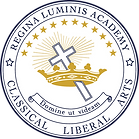CLASSICAL CURRICULUM

The aim of the Regina Luminis Academy curriculum is to educate the “whole person” by cultivating within the student the Theological Virtues of faith, hope, and charity; the Moral Virtues of prudence, justice, fortitude, and temperance; and the Intellectual Virtues of knowledge, understanding, wisdom, right judgment, and love of beauty.
Regina Luminis Academy presents to the student a unified view of knowledge by means of an integrated curriculum. The integration of subjects in the curriculum means that a relationship between one subject and another, and between all the subjects and the educational aims of the Academy is established, so that an ordered and unified view of knowledge is made possible for the student.
The Academy’s curriculum is integrated horizontally by the study of history, with the Incarnation as the pivotal and central event of that history. The various subjects are studied within the context of one given historical time-period emphasizing western civilization. The flow of this study brings the student through the course of human history: the classical world, early Christianity, medieval Europe, and the modern world.
The curriculum is integrated vertically by the study of Catholic truth. The study of the Catholic Faith can be said to be the “supreme integrating principle” of the Academy’s curriculum because it is reflected in the treatment of every subject. It becomes the frame of reference for viewing, interpreting, and evaluating every subject studied. The Catholic Faith, through its presence, influence, and illumination, gives order, unity, and intelligibility to the entire curriculum. Fundamentally, all human history leads toward the incarnation and is subsequently to be interpreted in light of the Incarnation. In this way, the horizontal progress of history is to be understood as one with the transcendent truth that Christ is the end, aim, and telos of the human condition. For example, the aforementioned integration is achieved when ancient pre-Christian cultures such as Greek civilization are studied to indicate how God worked in non-Christian societies to prepare an intellectual framework for subsequent Catholic theological reflection. Many theological concepts such as substance, accident, and homoousios have their origin in the Greek intellectual tradition. Consequently the horizontal historical perspective is merged with the vertical transcendent perspective to produce a harmonious whole.
